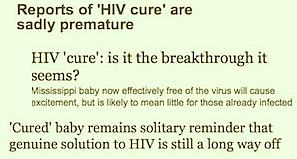Highlighting some of the important caveats & context in news of the HIV baby “functional cure”

The top trending health news story today – with more than 400 stories showing up on a web search so far – is that of the Mississippi baby pronounced “functionally cured” of HIV infection.
USA Today’s story included important caveats and perspective:
Experts note that the girl’s story is also unique — involving a string of unusual events — and won’t immediately lead to a cure for the 34 million people living with HIV worldwide. … The baby’s case was exceptional from the beginning. ...
Carlos del Rio, co-director of the Emory Center for AIDS Research and a board member at HIVMA (the HIV Medicine Association), who wasn’t involved in the study, [said:] “This kid could have died from the HIV infection. This outcome is the exception, rather than the rule.”
Del Rio says the child’s cure shouldn’t lead patients or parents to think they can stop medication.
The study’s authors say they don’t yet have enough evidence to recommend changing children’s care. First, they need to find out if this child’s cure was a one-of-a-kind miracle, or something that doctors can achieve in other babies.
The Mississippi child’s case likely will have a greater practical impact in developing countries, rather than the USA, [National Institute of Allergy and Infectious Diseases Director Anthony] Fauci says.
The New York Times story raised important questions:
Some outside experts, who have not yet heard all the details, said they needed convincing that the baby had truly been infected. If not, this would be a case of prevention, something already done for babies born to infected mothers.
“The one uncertainty is really definitive evidence that the child was indeed infected,” said Dr. Daniel R. Kuritzkes, chief of infectious diseases at Brigham and Women’s Hospital in Boston.
The Los Angeles Times raised that issue as well:
“If there is a trial that shows this can happen again, then this will be very important,” said Dr. Karin Nielsen, a pediatrician who specializes in infectious diseases at UCLA’s David Geffen School of Medicine who was not involved in the girl’s case. “You’ll be able to treat people very intensively and reverse the disease.”
Attempting to replicate the results in other HIV-positive infants is “our next step,” said Dr. Deborah Persaud, a virologist at Johns Hopkins Children’s Center who described the Mississippi patient at the Conference on Retroviruses and Opportunistic Infections. She and others are to make a formal presentation during the conference’s scientific program Monday.
Details of the unusual case have not yet been published in a medical journal so that other doctors and researchers can assess it. It’s possible that the girl — although at high risk for contracting the virus from her mother — was not actually infected herself, skeptics said.
The Wall Street Journal offered this context:
Researchers cautioned that the report on the baby girl involves just one patient, and the findings appear to have little immediate relevance to people who contract HIV as adults or adolescents and are almost always diagnosed and treated long after their initial infection. But if further study confirms that very early treatment can cure HIV-infected newborns, it could spur widespread use of such an aggressive regimen in babies born with HIV, nearly all of them in low- and middle-income countries.
The Washington Post stated clearly, high in the story:
Whether the cure is complete and permanent, or only partial and long-lasting, is not certain. ...
We are calling this a ‘functional cure,’ ” said Katherine Luzuriaga, a physician at the University of Massachusetts Medical School, who was involved in the baby’s care. “Time and further investigation will tell us whether this child actually has been cured or not.”
A quick scan of news coverage in the UK shows a direct, blunt assessment from some of the leading voices there.
The Mississippi baby remains a solitary and enigmatic reminder that a genuine cure of HIV is still a long way off.
The Guardian‘s story asks:
HIV ‘cure’: is it the breakthrough it seems? Mississippi baby now effectively free of the virus will cause excitement, but is likely to mean little for those already infected.
And the thorough NHS Choices Behind the Headlines site explains in great detail, “Reports of ‘HIV cure’ are sadly premature.”
Back in the US, CBS This Morning, Charlie Rose said “This could be a day of celebration for those with HIV and AIDS.” Thankfully, this was followed by very measured interview responses from Dr. Anthony Fauci. But compare that kind of story lead-in with the appropriately cautious and contextual content in the print stories listed above.
We hope the evening network news programs exercise restraint.
This is far from a complete or systematic sweep of the day’s news coverage of this story. I’m scrambling to catch up after two weeks of travel.
We welcome any observations about other news coverage we missed from readers.
——————————-
Follow us on Facebook, and on Twitter:

